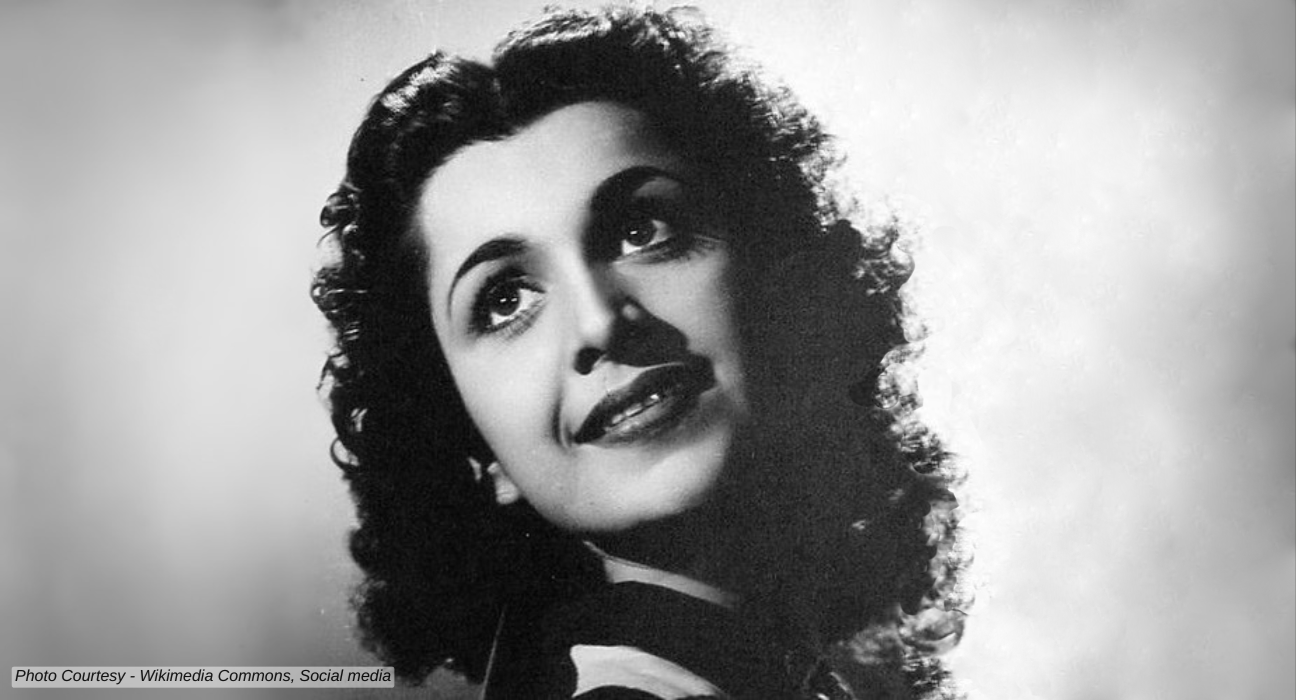When she played “Bahar” in Mughal-e-Azam, there was a lot of Nigar Sultana in the role—headstrong, beautiful, a great tactician and planner with dreams as bright as her eyes and as big as her heart. I always think that Bahar could have been a great queen—shrewd, cold, calculated, and practical—and Nigar was the quintessential Bahar; you can’t think of anyone else in the role.
She was the light-eyed enchantress of the 1940s and 1950s and was known for her dominating screen presence and films like ‘Aag’ (1948), Patanga’ (1949), ‘Sheesh Mahal’ (1950), ‘Mirza Ghalib’ (1954), ‘Yahudi’ (1958), ‘Mughal-e-Azam’ (1960), and ‘Do Kaliyaan’ (1968).
Early Life and Career
Nigar Sultana was born on June 21, 1932, in Hyderabad, British India, into a reputed family. His father was a major in the army of Nizam. Nigar developed an interest in films and acting while doing school dramas and watching films like Mehboob Khan’s “Hum Tum Aur Woh (1938).”
According to a report in a leading publication, her father died when she was a teenager, leaving the family distraught and somewhat struggling. Seeing this, his father’s friend, actor-director Jagdish Sethi, advised her to try out in films. With his help, she got her first film, Rangbhoomi (1946), which was directed by Mohan Bhavnani.
Rang Bhoomi was followed by Mohan Sinha’s 1857 (1946), which also stars Suraiya, Bela (1947), Shikayat (1948), Mitti Ke Khiloune (1948), and Nao (1948).
Breakthrough

Nigar’s breakthrough comes with her role as ‘Nimmy’ in Raj Kapoor’s directorial debut, “Aag (1948),” and despite it being a very small role, she gets critical acclaim and audience appreciation.
Her next success was H. S. Rawail’s “Patanga (1949),” where she danced on the popular song “Mere Piya Gaye Rangoon.” She followed it by Satish Nigam’s Sunehre Din (1949) with Raj Kapoor, K. Amarnath’s Bazaar (1949) with Shyam, Homi Wadia’s Balam (1949) with Suraiya and Wasti, Sohrab Modi‘s Sheesh Mahal (1950), S. M. Nawab’s Khel (1950), Nanabhai Bhatt’s Daman (1951), S. M. Yusuf’s Hyderabad Ki Nazneen (1952), and Anand Bhawan (1953).
In 1954, in Sohrab Modi’s “Mirza Ghalib,” with Bharat Bhushan and Suraiya, she was cast as Ghalib’s devoted wife, Umrao Begum. The film went on to win the National Award for Best Feature Film.
Nigar Sultana – Bahar
Nigar continued to work in films like Mastana (1954), Mangu (1954), Khaibar (1954), Sardar (1955), Umer Marvi (1956), Durgesh Nandini (1956), She famously starred in Bimal Roy‘s Yahudi (1958) with Dilip Kumar, Sohrab Modi and Meena Kumari. In the film, she played the Princess Octavia.
Sultana’s most celebrated performance came as ‘Bahar’ in K. Asif’s epic Mughal-e-Azam (1960), where she played a court dancer envying the love between Prince Salim and Anarkali. She was specially praised for her cold delivery and holding her ground against Dilip Kumar in the famous Confronting Scene, where she told Salim, “Khanjar ko ek bar aur surkh-ru hone ka mauqa dijiye, Kaneez ke seene me bahut khoon hai.”
After Mughal-e-Azam,” she did not work much; a few of her last films were Raaz ki Baat (1962), Taj Mahal (1963), Mere Hamdam Mere Dost (1968), Do Kaliyaan (1968), Bansi Birju (1972), and her last, Jumbish: A Movement—The Movie (1986).


Personal Life and Later Years
In the early 1950s, Nigar married director SM Yusuf, with whom she worked in films like Bikhare Moti, Hyderabad Ki Nazneen, and Anand Bhawan. Together, they had a daughter, Heena Kausar, who also worked in a few movies in the 1970s. The marriage lasted for five years; they separated, and SM Yusuf moved to Pakistan.
Nigar Sultana and Mughal-e-Aazam director K. Asif get close with each other during the shooting of the epic and finally get married around 1960. Nigar Sultana and Asif had four children: Akbar Asif, Shaukat Asif, Shabana, and Muneeza. According to media reports, after K. Asif’s marriage to Dilip Kumar’s sister, Akhtar Asif, Nigar felt betrayed and even filed a case against K. Asif.
Her growing age, weight gain and the legal case affected her film work, pushing her to start a furniture business. In later life, Nigar stepped back from films, focusing on business ventures. Nigar Sultana passed away on April 21, 2000, in Mumbai.
Nigar Sultana on IMDB














Leave feedback about this